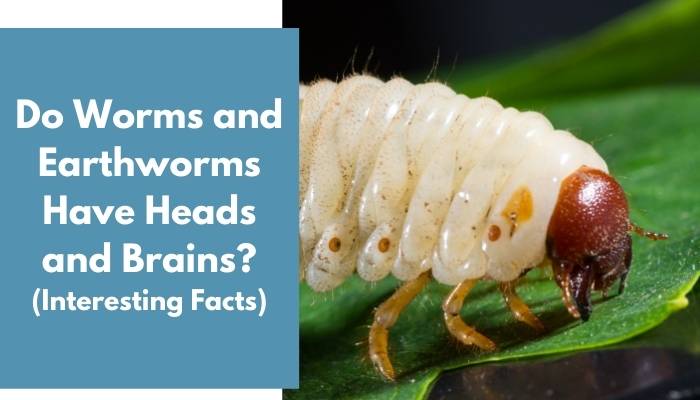If you are fond of the ground and plants, you probably have seen more worms than other people. Sometimes, these animals can be fascinating, but most of the time, they only seem to wriggle around. So, you may wonder if they actually have heads and brains. Thus, it begs the question:
Do worms and earthworms have heads and brains? Yes, worms and earthworms do have heads and brains, but it’s not really that complex. The brain sits next to the other organs. Further, it connects the nerves from the worm’s skin and muscles. With it, worms can control how they feel and move. Still, the brain isn’t enough for them to think.
Worms and earthworms do have brains. It’s what makes them register pain and coordinate movements with what they sense. Still, it’s not enough for them to do some critical thinking.
If you want to know more about worms and their heads and brains, read on. In this article, we’ll tackle every question related to worms and their heads and brains.
Without further ado, let’s get into it!
Contents
Do worms and earthworms have heads?
At a glance, worms and earthworms seem nothing like a long body with no head. However, if you take a closer look, you can see they have a distinctive head and tail.
The worm’s head is always at the end closest to the clitellum. The clitellum is the swollen band that encircles them.
Another thing to note is that the head of the worm can survive and regenerate even if the tail gets cut.
The head is crucial in a worm’s life because the rest of its body won’t survive without it.
For instance, if you cut the worm in half and the clitella come along with the head, it can still survive.
However, if the clitella get cut off away from the head, then the worm won’t survive.
Related Articles About Worms Anatomy:
- Do Worms and Earthworms Have Eyes?
- Do Worms and Earthworms Have Mouths?
- Do Worms and Earthworms Have Bones?
- Do Worms and Earthworms Have Legs?
How many heads does a worm have?
Worms usually have one head, but they have many segments. For instance, a red wiggler has many segments.
This kind of worm is often a tool for composting. The more head segments it loses, the less likely it will be to recover fully.
Another kind of worm is the marsh-loving blackworm. While it also has many segments, it always generates eight replacement head segments.
In general, a worm would only have one head and it’s on the opposite side of the tail.
Still, worms contain segments, which can regenerate if cut into two. However, they can only regenerate if the head doesn’t get separated from the clitella.
Do worms and earthworms have a brain?
Worms and earthworms do have a brain, and it’s what they use to feel pain and coordinate movements with their senses.
Still, since they are small animals, their brains aren’t that complicated. Of course, they need a brain since it functions for basic movements.
Nevertheless, the brain of worms remains incapable of critical thinking, much more of emotions.
Each of the brains sits next to its other organs. It connects the nerves from the worm’s skin and muscles. Thus, the worm can control how it feels and moves.
How many brains does a worm have?
Most of the segmented worms or annelids have two cerebral ganglia. In simple terms, it’s the bundle of a nerve cell that forms a primitive bilobed brain.
It’s where sensory and motor nerve fibers lead to other areas of the body. With it, worms can register pain and coordinate movements in their body.
The most common annelids are the earthworms, which have thousands of species.
While they may have two bilobed brains, such organs can’t analyze and execute emotions and critical thinking.
Do worms think?
While worms have brains to register pain and coordinate movement, they can’t think.
Worms may have a brain that connects with nerves from their skin and muscles. However, the nerves can’t execute critical thinking like ours can.
The nerves can detect light, vibrations, and even some tastes, and the muscles of their bodies make movements in response. Still, the brain of worms can only do this far.
They can’t process emotions, critical thinking, and other complex activities that our brains can do.
Are worms intelligent?
Worms aren’t as intelligent as other animals, but they can do certain things through their brains.
For instance, the nerves can detect light, vibrations, and even some tastes.
Moreover, the muscles of their bodies make movements in response.
In general, worms can do some things with the help of their brain. However, it doesn’t come as far as giving them the ability to do some critical thinking as well as register emotions.
Read also other articles about worms’ hair, hearts, blood, lungs and ears.
Do worms have memories?
Some worms do have memories, but most of them don’t. According to a certain article, some species of flatworms keep memories even after getting decapitated.
Some of the researchers found out that a certain type of flatworm can remember events. Such events are the ones that transpired before having its head removed.
Still, most worms use more of the brains for pain and movement than keeping memories.
Do worms have faces?
Worms don’t have faces, but they do have small mouths where they take in the food in front of them.
Since worms are small animals, the head doesn’t have the space to give worms some full features like ours.
Moreover, these animals don’t have eyes or noses, which means they can’t see or hear.
Though it may seem like a hassle for us, such senses aren’t useful to the lifestyle of worms.
In general, they only need light and dark receptors and the skin for sensing vibrations.
However, they don’t have a face, especially if it includes the eyes or nose.
Summary
In general, worms and earthworms do have heads and brains, but it’s not really that complex. The brains sit next to organs, allowing them to transfer data or information in the nerves.
While worms do have brains, they still can’t do some critical thinking or express emotions. Most of the movements and actions of worms are responses to the stimuli they sense.



